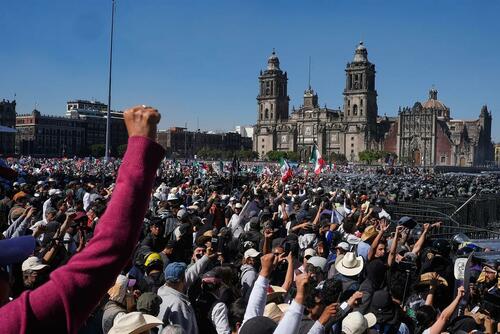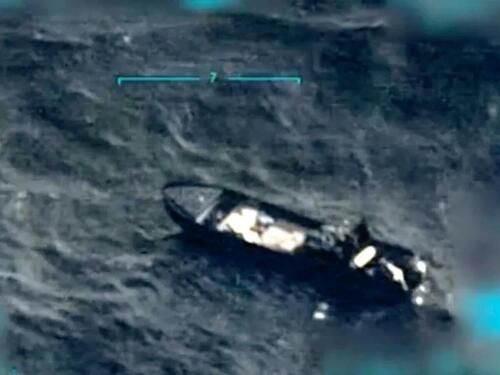On November 15th, incendiary protests engulfed over 50 cities across Mexico.
The Western media has universally adopted the narrative disaffected local “Gen Z” sought to vent their righteous rage against the government, over corruption, and the administration’s purported ties to drug cartels. Footage of law enforcement clashing with demonstrators spread like wildfire, and many outlets widely emphasised how the upheaval injured at least 120 people. Few acknowledged the overwhelming majority of those hurt - 100 - were police officers.
A New York Times report made the insurrectionary designs of those causing mayhem on Mexico’s streets clear.
“The goal of this march is precisely to remove the President, and to show we are angry, that the people are not with her,” one protester was quoted as saying.
Oddly absent from mainstream coverage of the hullabaloo was any recognition President Claudia Sheinbaum enjoys popularity of which Western leaders can only fantasise.
Polls throughout her first year in office indicate 70 - 80% of the public support her.
Sheinbaum has charged the fiery demonstrations were “inorganic”, “paid for”, and “a movement promoted from abroad against the government.” There are strong grounds to believe this was absolutely the case. For one, a key local amplifier of the protests, and supposed police brutality, was media outlet Animal Politico. The National Democratic Institute, a wing of avowed CIA front the National Endowment for Democracy, lists the organisation among its “partners”. Mexican newspaper Milenio has documented in detail the news site’s voluminous US funding.
Furthermore, former Mexican President Vicente Fox attended the protests, and posted extensively on social media in support of the demonstrators. In 2001, he was bestowed NED’s Annual Democracy Award. Another prominent supporter was oligarch Ricardo Salinas Pliego, Mexico’s third-richest man. In March 2023, in conjunction with the shadowy Atlas Network, he launched Universidad de la Libertad, to “advance free-market principles, business development, and innovation” in the country.
Atlas Network comprises a web of libertarian think tanks, bankrolled by major US corporations, with deep and cohering ties to Western foundations and intelligence cutouts, including NED. The Network itself doles out millions annually “supporting pro-freedom organizations” worldwide. A longtime beneficiary of its largesse is the Venezuela-based Center for the Dissemination of Economic Information (CEDICE), which operated at the forefront of the April 2002 US-orchestrated coup that temporarily ousted elected President Hugo Chávez.
Fast forward to today, and Washington again appears to be plotting the Venezuelan government’s downfall. A huge military buildup around the country, and belligerent actions in the Caribbean supposedly intended to thwart drug trafficking operations directed by Caracas, could be harbingers of all-out invasion. The widely-admired Sheinbaum, who stands steadfastly opposed to US machinations in Latin America, represents a significant barrier to realising that goal. It stands to reason the Empire must neutralise her first, before training its crosshairs elsewhere in the region.
‘Legal Justification’
It may be no coincidence the foreign-sponsored upsurge of anti-government agitation that unfolded in Mexico followed not long after murmurings the Trump administration is considering inserting US forces and intelligence operatives into the country, to conduct aggressive covert operations supposedly targeting cartels. On November 3rd NBC reported this “new mission” would represent “a break” with the approach of past US governments, which have hitherto “quietly deployed CIA, military and law enforcement teams” to “support local police and army units” battling drug syndicates:
“If the mission is given the final green light, the administration plans to maintain secrecy around it and not publicize actions associated with it, as it has with recent bombings of suspected drug-smuggling boats…Under the new mission…US troops in Mexico would mainly use drone strikes to hit drug labs and cartel members and leaders…Some of the drones that special forces would use require operators to be on the ground to use them effectively and safely.”
Similar action was previously mooted in April, prompting a firm rebuke from Sheinbaum. The President declared: “The US is not going to come to Mexico with the military. We cooperate, we collaborate, but there is not going to be an invasion. That is ruled out, absolutely ruled out.” However, NBC notes while Washington “would prefer to coordinate with the Mexican government on any new mission against drug cartels…officials have not ruled out operating without that coordination.”
US military action being waged inside Mexico without state approval would represent an absolutely egregious and unprecedented breach of the country’s sovereignty. Moreover, at Washington’s demand, Sheinbaum has already deployed 10,000 troops to the US border, significantly increased fentanyl seizures, and extradited 55 senior cartel figures Stateside. These escalations are nonetheless seemingly insufficient, raising obvious questions as to whether an ulterior motive lies behind the Trump administration’s new mission - for which elite military and CIA personnel have apparently already begun training.
One explanation could be Sheinbaum representing a potent barrier to regime change in Caracas - a monstrous objective for which Trump strived over much of his first term in office, that has become turbocharged over recent months. Sheinbaum has publicly rubbished the US President’s claims there is evidence linking Venezuelan leader Nicolás Maduro to drug dealing, called for constructive dialogue between the pair, and repeatedly condemned extrajudicial US airstrikes on boats purportedly ferrying drugs, which have killed scores of potentially innocent people.
US strike on supposed narco-terrorists, September 2025
Those attacks, which began in September, are widely perceived to be a prelude to all-out US invasion of Venezuela, and have frequently been conducted in Mexico’s territorial waters. In addition to openly admitting they aren’t certain targeted boats are in fact ferrying narcotics, and the identities of victims are unknown, Trump administration officials have struggled to provide any legal justification whatsoever for the deadly strikes. On October 30th, a classified bipartisan Congressional briefing was convened, at which government representatives attempted to explain their rationale.
Attendees from both primary US political parties “were not happy with the level [of] information that was provided, and certainly the level of legal justification that was provided,” Republican Mike Turner complained. Meanwhile, Democrat Sara Jacobs declared, “I’m not convinced that what they said was accurate,” concluding the administration’s strategy “is actually not about addressing” the flow of narcotics into the US, or crushing Latin American drug smuggling networks. Her comments may be more illuminating than she intended.
‘Big Problems’
On top of clearing a beachhead for invading Venezuela, Sheinbaum could be earmarked for removal by Washington because, from the CIA’s perspective, the Mexican President’s hardline crackdown on local cartels may be proving too successful for her own good. Within six months of taking office, police and security forces dismantled 750 drug labs across the country, arrested close to 20,000 cartel operatives, and seized over 140 tons of narcotics. Drug barons who evaded capture have been forced into hiding, while suffering multimillion dollar losses.
Mexican authorities arrest high-ranking Sinaloa Cartel member, February 2025
Markedly, these efforts largely haven’t been conducted in coordination with Washington. This raises the prospect that individuals and groups ensnared by Sheinbaum’s anti-cartel crusade - which has been praised in many quarters - might one way or another have been working for and/or with the CIA. Investigations by veteran deep state researcher Peter Dale Scott reveal how since World War II, the core component of any international drug cartel’s success has consistently been maintaining a clandestine relationship with US intelligence.
Indeed, per Scott, it is difficult if not impossible to prosper in the narcotics trade without the CIA’s protection. A palpable illustration of this phenomenon is provided by the Guadalajara Cartel’s extraordinary rise. After its founding in the late 1970s, the group rapidly became one of North America’s largest drug suppliers. Key to its success was its covert bond with Mexico’s Federal Security Directorate (DFS), which was created by and enjoyed a deeply intimate relationship with the CIA.
In return for a 25% cut of the Guadalajara Cartel’s profits, the ultra-violent drug syndicate was not only insulated from legal repercussions, but actively assisted by DFS. Joint US-Mexican anti-drug efforts in the early 1980s deliberately targeted solely minor traffickers, eliminating the Cartel’s competition. Resultantly, by 1982 Mexico had replaced Colombia as the States’ leading supplier of marijuana, and was providing up to 30% of the country’s cocaine. All along, the CIA and DEA did and said nothing, despite full cognisance of the Cartel’s activities.
Guadalajara might still be in business today, were it not for its February 1985 kidnap, brutal torture and murder of DEA agent Enrique Salazar. Allegations the CIA and DFS colluded in his killing, to conceal their complicity in the Latin American drug trade, have long-abounded. Nonetheless, Salazar’s slaying was so sickeningly savage it led to sizeable US public and political pressure for Mexican authorities to bring those responsible to justice. Within four years, several of the Cartel’s leaders were jailed, and the enterprise folded.
Enrique Salazar’s mutilated corpse is returned to the US
There is no knowing whether Sheinbaum has inadvertently trodden on the ‘wrong’ person’s toes in her battles against organised crime in her country. Yet, the violent protests have evidently provided Washington enormously useful ammunition. Commenting on the unrest, Trump remarked, “I looked at Mexico City over the weekend. There’s some big problems there…I am not happy with Mexico.” He added military action “to stop drugs” there was “OK with me.” The opening salvo in a new US war may have just been fired.
Loading recommendations...



